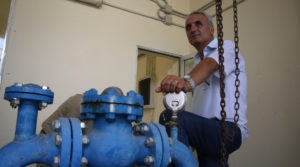Migration is here to stay, funding public services is vital to address it
 His name is George. Every morning, this employee of the North Lebanon Water Authority wakes up with an obsession: to provide drinking water to all the families in Wadi Khaled village. A huge challenge, as its population has doubled in size since 2011 due to the arrival of tens of thousands of Syrians fleeing the bombardments. Even before the war, few households had access to running water. Since then, the number of refugees has surpassed that of Lebanese citizens, exacerbating tensions in this deprived region.
His name is George. Every morning, this employee of the North Lebanon Water Authority wakes up with an obsession: to provide drinking water to all the families in Wadi Khaled village. A huge challenge, as its population has doubled in size since 2011 due to the arrival of tens of thousands of Syrians fleeing the bombardments. Even before the war, few households had access to running water. Since then, the number of refugees has surpassed that of Lebanese citizens, exacerbating tensions in this deprived region.
Her name is Moradeke, but everybody calls her Abi. Becoming a nurse was her dream since childhood, in order to save lives. In Nigeria, nurses have been more valuable than ever since 2009, because millions of people have been forced into exile because of the terror spread by the Islamist sect Boko Haram in the region. In the midst of a humanitarian crisis, nurses are the only ones dealing with cholera and malnutrition in refugee camps. And they do that at the risk of their lives: Boko Haram has kidnapped and killed dozens of them.
Her name is Luciana, and she is a school principal in Talismán, right on the border between Mexico and Guatemala. She runs a school where local Chiapas children mingle with migrants who have left Guatemala, Honduras or El Salvador, sometimes by themselves, leaving gang violence and misery behind them.
George, Moradeke, Luciana… Like them, they are a legion of unknown heroes who face the reality of migration every day. We never think of them, but public service workers are at the frontlines providing basic services to migrants, asylum seekers, and refugees. They are the ones who deal not only with water, sanitation, healthcare, housing, education, and administrative support, but also provide services that are critical in emergency response, disasters, displacement, and reconstruction.
Forced displacement is a global phenomenon that can’t be treated as a one-off crisis anymore. Political instability, violence, poverty and climate change are driving the highest levels of movement on record. About 258 million people – one in every 30 – were living outside their country of birth in 2017. Many have lost their lives during their migration journey. According to the International Organization for Migration’s missing migrants project, almost 30,000 people have died in transit over the past five years.
Climate change makes the outlook even bleaker. A recent World Bank report found that more than 140 million people in just three regions of the developing world are likely to migrate within their native countries between now and 2050, creating hotspots where tens of millions will pour into already crowded slums.
The current political scenario presents a deeply worrying trend in a number of developed and developing nations. Far-right, nationalist and populist political parties and authoritarian governments, whose campaigns are based on racist and xenophobic propaganda, are coming into power.
Public hostility is fuelled by ordinary citizens feeling that they have to share increasingly scarce resources with migrants. Newcomers are presented by far-right politicians not only as offenders, but also as those who will take all quality jobs. Because of them, the level of public schooling will drop. Because of them, it will take even longer to be attended in hospitals. Because of them, drinking water will be rationed. Ask George, in Lebanon, he can tell you a lot about it.
This misleading narrative diverts attention from the real drivers of the decline in the quality of education, healthcare, transport, or sanitation. In fact, this decline is the result of most governments deciding to attack their own public services, by reducing their budgets or by privatizing them. Migrants are not responsible for this situation.
Moreover, some private companies are now exploiting what is presented as a migrants’ crisis for profit. Needs that should be met by public services are delegated to private companies. In the United States, Donald Trump’s « Zero-Tolerance » immigration policy means big money for contractors – from private prison and tech firms to defense and transport companies.
Across the European Union, private contractors have received cash from governments to meet the challenge of detaining, policing and processing refugees. And there is no financial incentive for these firms to provide decent health care, food or education in their shelters. Also, hotel operators are paid by governments to house asylum seekers, but most of them don’t give them access to hot water and toilets.
At Public Services International, an international trade union federation dedicated to promoting quality public services all over the world, we are convinced that in a democratic society, access to work, education, health care, dignified retirement, quality infrastructure, mobility services, equal opportunities for men and women, culture – all of this under environmentally-friendly conditions – are not just services, but rights for all.
As George, Moradeke, Luciana and many others show every day, public service workers and their unions are uniquely placed to facilitate addressing the global forced displacement happening in our century. They fight inequality and build resilient and inclusive societies.
Funding public services is the only way not to let greedy companies take advantage of all kinds of misery. It is also the best response to those who propagate a message based on fear, lies and, hate.
Public services are the bedrock of solidarity. Public services are human rights.
By Geneviève Gencianos
